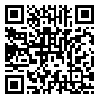BibTeX | RIS | EndNote | Medlars | ProCite | Reference Manager | RefWorks
Send citation to:
URL: http://ijn.iums.ac.ir/article-1-738-en.html
Background and Aim: Diabetes mellitus is a chronic disease and an increasing health problem worldwide. The purpose of this study was to examine the effect of educational intervention focusing on Health Belief Model on self care behaviors of diabetic patients.
Material & Method: This was a clinical trial study in which the study population consisted of diabetic patients attending in 4 hospitals in Tehran in 2006. Seventy and one patients were selected and randomly assigned to either intervention group (35 patients) or control group (36). After determining their education needs using the health belief model, education program was implemented for intervention group. At the initial visit and two month after education, self care behaviors, HBM's domains and awareness of patients were assessed using an interview schedule and a questionnaire. SPSS software (version 12) was used for statistical analysis.
Results: Independent T test didn’t show any statistically significant difference between two groups in the awareness, self care behaviors and HBM's domains before the educational program (P>0.05). After implementing the program, the same test indicated a statistically significant difference between two groups in HBM's domains (P<0.05), except in perceived barriers and perceived benefits domains (P>0.05). Also, a statistically significant difference was seen between two groups in self care behaviors domains (P<0.05), except in foot care domain (P>0.05). After education, paired T test and wilcoxon test indicated a statistically significant difference in mean and median of awareness, perceived susceptibility, perceived severity, self efficacy and self care behaviors in intervention group (P<0.05).
Conclusion: Implementing education program based on Health Belief Model is useful to predict and change self care behaviors of diabetic patients.
Received: 2010/03/17 | Accepted: 2014/08/25 | Published: 2014/08/25
| Rights and permissions | |
 |
This work is licensed under a Creative Commons Attribution-NonCommercial 4.0 International License. |




